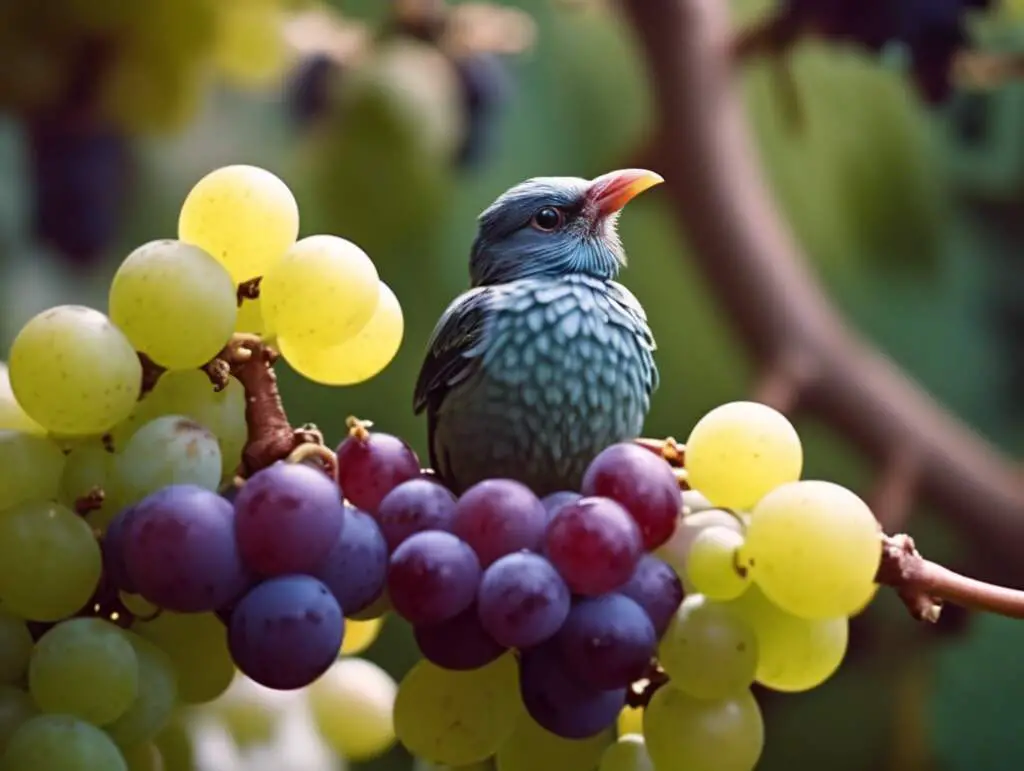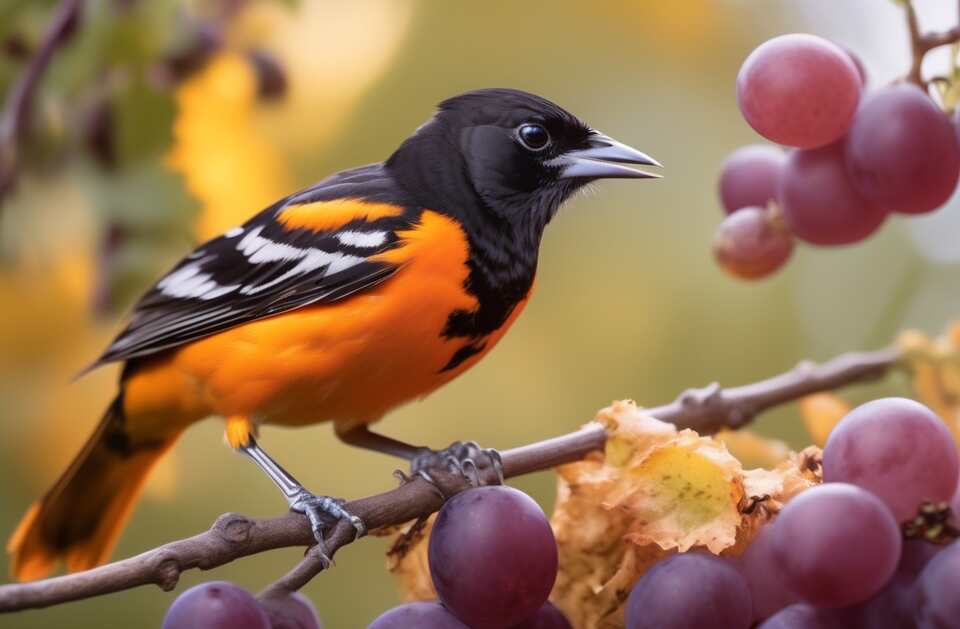Grapes are a popular fruit that many people enjoy as a sweet and juicy snack. But when it comes to birds, the question arises: can they safely consume grapes? As a bird owner or someone interested in feeding birds, it’s essential to understand the impact of grapes on our feathered friends.
Table of Contents
Can Birds Safely Consume Grapes?
Understanding Bird Diets
Birds have specific dietary requirements that differ from humans and other animals. Their diet mainly consists of seeds, fruits, insects, and nuts, depending on the species. While some fruits are safe and beneficial for birds, others can be harmful and should be avoided.
Are Grapes Safe for Birds?
Grapes are generally safe for birds to consume, including common household pets like parrots and canaries. However, there are some essential considerations to keep in mind before offering grapes to birds. It’s crucial to feed them grapes in moderation and ensure they are fresh and thoroughly washed to remove any pesticides or chemicals that could be harmful to birds.
Nutritional Benefits of Grapes for Birds
Like humans, birds can benefit from the nutrients found in grapes. Grapes are rich in vitamins C and K, as well as antioxidants that can support overall health and immunity in birds. The water content in grapes can also help keep birds hydrated, especially during hot weather.
Potential Risks of Feeding Grapes to Birds
While grapes can be a nutritious and tasty treat for birds, there are still some risks associated with feeding grapes to certain bird species. The most crucial consideration is the presence of seeds in grapes, as they can be a choking hazard for birds. It’s vital to either remove the seeds or choose seedless grapes when feeding them to birds.
Moderation is Key
As with any new food introduced to a bird’s diet, moderation is key when offering grapes to birds. While grapes can provide nutritional benefits, they should not replace their regular diet. It’s essential to offer a diverse range of foods to ensure that birds receive all the essential nutrients they need to thrive.
Birds can safely consume grapes as part of their diet, given that they are fed in moderation and without seeds. Grapes can provide nutritional benefits and serve as a healthy treat for birds. However, it’s crucial to be mindful of any potential risks, such as choking hazards from grape seeds. By understanding the proper way to feed grapes to birds, you can ensure that they enjoy this fruit safely and benefit from its nutrients.
Exploring Alternative Fruits for Avian Diets
Birds are fascinating creatures with unique dietary requirements. While seeds and nuts are commonly associated with a bird’s diet, many bird species can also enjoy fruits as part of their nutrition. One question that often arises is, can birds eat grapes? Let’s explore this topic further to understand the implications of feeding grapes to our feathered friends.
Understanding Avian Diets
Birds have diverse dietary needs depending on their species. While seeds and pellets are staple foods for many birds, incorporating a variety of fruits and vegetables can provide essential nutrients and enrichment to their diet. Fruits like grapes can be a source of vitamins, minerals, and antioxidants for birds, making them a potentially healthy addition to their meals.
Can Birds Eat Grapes?
Grapes are safe for many bird species to consume, including parrots, canaries, finches, and cockatiels. However, it is essential to note that grapes should be given to birds in moderation. The high sugar content in grapes can be harmful if consumed excessively. Therefore, grapes should be offered as an occasional treat rather than a primary food source for birds.
Can Wild Birds Eat Grapes?
Grapes are occasionally enjoyed by several wild bird species when they come across them, particularly in urban and suburban environments where grapes might be accessible. While not a staple in their diet, some wild birds known to consume grapes include:
Similar to pet birds, wild birds should be offered grapes in moderation. The high sugar content can be harmful if consumed excessively, potentially leading to health issues. Therefore, it’s best to provide grapes as an occasional treat rather than a regular part of their diet.
Benefits of Feeding Grapes to Birds
When offered in moderation, grapes can have several benefits for birds. They are a good source of hydration, especially during hot weather. The moisture content in grapes can help keep birds hydrated, which is crucial for their overall health. Additionally, the vitamins and antioxidants present in grapes can contribute to a bird’s well-being and immune system support.
Risks and Considerations
While grapes can be a nutritious snack for birds, there are some risks to be aware of. The seeds and skins of grapes contain compounds that can be toxic to birds in large quantities. It is essential to remove seeds and cut grapes into small, bite-sized pieces to prevent choking hazards. Additionally, some bird species may be more sensitive to the acidity in grapes, so it is crucial to observe how your bird reacts to this fruit.
Alternatives to Grapes
If you are unsure about feeding grapes to your bird or want to explore alternative options, there are many other fruits that you can offer. Apples, berries, melons, and oranges are popular choices among bird owners. These fruits provide a variety of nutrients and flavors for birds to enjoy without the potential risks associated with grapes.
Birds can eat grapes in moderation as part of a balanced diet. While grapes offer nutritional benefits, it is essential to feed them responsibly and consider any potential risks. By understanding your bird’s dietary needs and preferences, you can provide a diverse and enriching diet that promotes their health and well-being. Remember to consult with a veterinarian or avian specialist for specific dietary recommendations for your bird species.
Conclusion
While grapes can be a delicious and nutritious treat for humans, they may not be the best option for our feathered friends. It is essential to prioritize the health and well-being of birds by being mindful of the foods we offer them. Although there is conflicting information about whether birds can safely consume grapes, erring on the side of caution is always advisable.
Exploring alternative fruits for avian diets can lead to a more balanced and varied nutritional intake for our avian companions. Fruits such as apples, berries, melons, and bananas can offer birds a wide range of vitamins, minerals, and antioxidants without the potential risks associated with grapes. These fruits can be offered in moderation as part of a well-rounded diet that also includes seeds, nuts, vegetables, and pellets.
When introducing new foods to your bird’s diet, it is essential to do so gradually and observe their response. Monitoring for any signs of digestive upset, such as diarrhea or changes in behavior, can help you determine if a particular fruit is suitable for your bird. Consulting with a veterinarian or avian nutrition expert can also provide valuable guidance on the best diet for your specific bird species.
Remember, each bird is unique, and what works well for one bird may not be suitable for another. By offering a diverse range of fruits and vegetables, you can ensure that your feathered companion receives the essential nutrients they need to thrive. Providing a stimulating environment, regular exercise, and social interaction are also crucial aspects of maintaining your bird’s overall health and well-being.
While the question of whether birds can safely consume grapes remains somewhat unclear, there are plenty of other fruit options available that can provide similar nutritional benefits without the potential risks. By being mindful of your bird’s dietary needs and preferences, you can create a healthy and enjoyable eating experience for your avian friend. Experimenting with different fruits and vegetables can be a fun way to discover your bird’s favorite treats while promoting their overall health and longevity.



